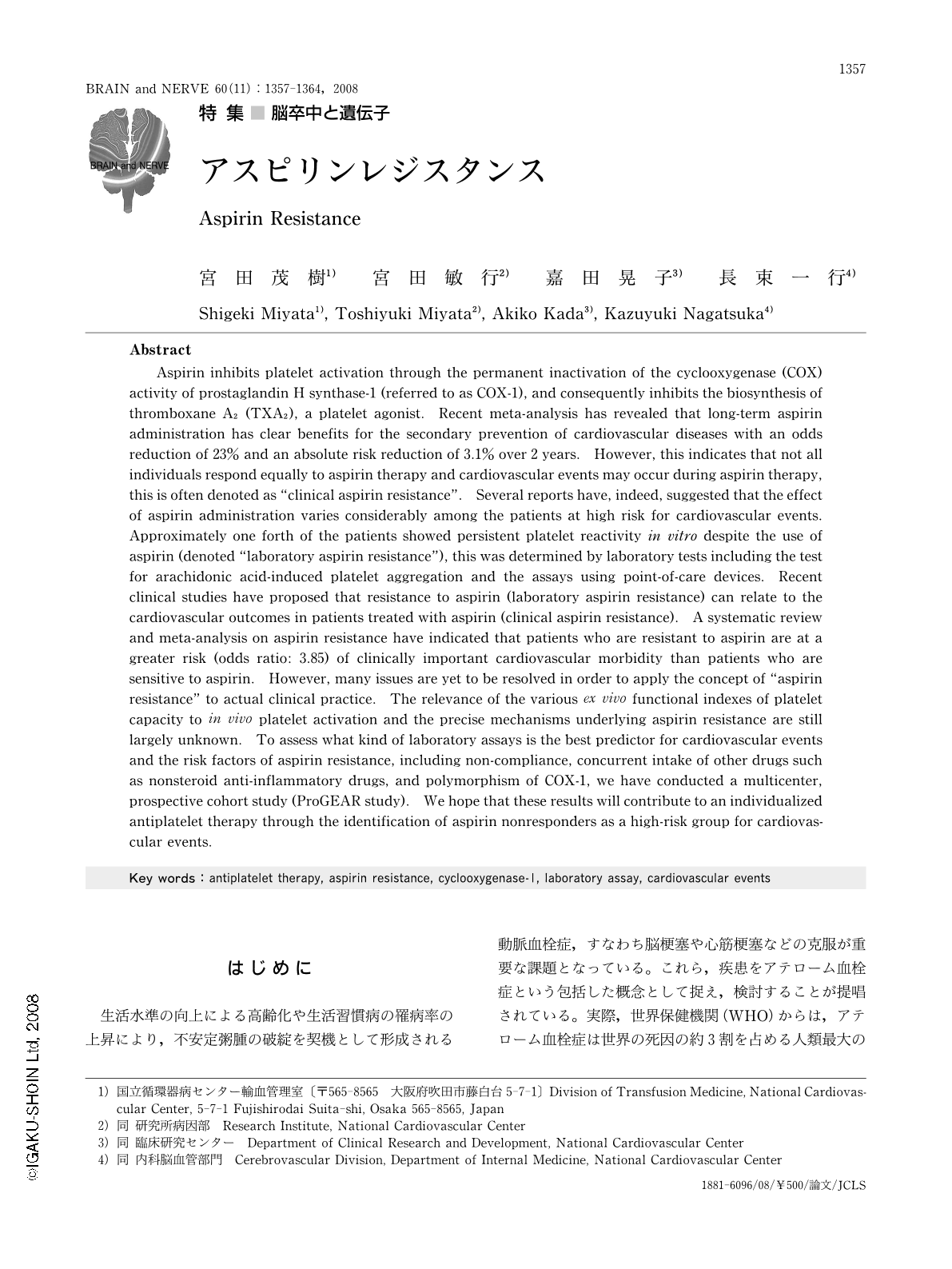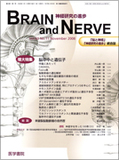Japanese
English
- 有料閲覧
- Abstract 文献概要
- 1ページ目 Look Inside
- 参考文献 Reference
はじめに
生活水準の向上による高齢化や生活習慣病の罹病率の上昇により,不安定粥腫の破綻を契機として形成される動脈血栓症,すなわち脳梗塞や心筋梗塞などの克服が重要な課題となっている。これら,疾患をアテローム血栓症という包括した概念として捉え,検討することが提唱されている。実際,世界保健機関(WHO)からは,アテローム血栓症は世界の死因の約3割を占める人類最大の疾患であると報告されている。
動脈血流下では,液相の凝固カスケードは有効に機能せず,流動状況下で血管壁損傷部位に粘着し得る血小板の存在が,血栓形成の初期段階には必須となる。したがって,アテローム血栓症に対する最も基本的な薬物療法は,抗血小板療法となる。その中で,アスピリンは,その使用経験が長く,薬価が非常に安いという大きな利点を有しており,副作用として消化管出血,アスピリン喘息など注意すべき点も多いが,チエノピリジン系薬剤で発生するような血栓性血小板減少性紫斑病(thrombotic thrombocytopenic purpura:TTP),無顆粒球症,肝障害などの重篤な副作用に関する懸念が比較的少ないために,最も多用されている抗血小板薬である。
代表的抗凝固薬であるワルファリンは,その投与患者において,その効果をPT-INR(Prothrombin Time-International Normalized Ratio:プロトロンビン時間-国際標準化比)等でモニタリングしながら投与量を調節し,治療を行う。一方,アスピリンに代表される抗血小板薬は,モニタリングを行わず,一定量で投与されることが多い。しかしながら,アスピリンの血小板機能抑制効果には個人差がある,との報告が以前からなされており,アスピリンの効果に関するモニタリングの必要性について指摘する声もあった。
近年,このアスピリンの血小板機能抑制効果に関する個人差が,臨床的な意義を持つのではないか,すなわち,アスピリン投与を受けているにもかかわらず,血小板機能抑制効果が弱い患者群をアスピリン抵抗性(aspirin resistance)と定義した場合,アスピリンによって効果的に血小板機能が低下しているアスピリン感受性群の患者と比較して,アスピリン抵抗性群では,心血管イベントの再発が有意に多く認められるとの報告が増加し,「アスピリン抵抗性(aspirin resistance)」という概念が改めて注目を集めるようになった。この概念は,患者個々に合った薬剤ならびに投与量を,その効果をモニタリングしながら使用することで,最大限に有効で,かつ副作用の少ない治療を模索する個別化医療に向けた検討につながることもあり,さまざまな検討がなされてきている。
本稿では,アスピリン抵抗性(aspirin resistance)に関する現時点での流れについて概説するとともに,筆者らが行っているアスピリン抵抗性に関する多施設共同前向き観察研究である「アスピリン抵抗性の実態ならびにその遺伝子背景に関する研究(The Study on Profile and Genetic factors of Aspirin Resistance: ProGEAR study)」について,紹介したい。
Abstract
Aspirin inhibits platelet activation through the permanent inactivation of the cyclooxygenase (COX) activity of prostaglandin H synthase-1 (referred to as COX-1),and consequently inhibits the biosynthesis of thromboxane A2 (TXA2),a platelet agonist. Recent meta-analysis has revealed that long-term aspirin administration has clear benefits for the secondary prevention of cardiovascular diseases with an odds reduction of 23% and an absolute risk reduction of 3.1% over 2 years. However,this indicates that not all individuals respond equally to aspirin therapy and cardiovascular events may occur during aspirin therapy,this is often denoted as "clinical aspirin resistance". Several reports have,indeed,suggested that the effect of aspirin administration varies considerably among the patients at high risk for cardiovascular events. Approximately one forth of the patients showed persistent platelet reactivity in vitro despite the use of aspirin (denoted "laboratory aspirin resistance"),this was determined by laboratory tests including the test for arachidonic acid-induced platelet aggregation and the assays using point-of-care devices. Recent clinical studies have proposed that resistance to aspirin (laboratory aspirin resistance) can relate to the cardiovascular outcomes in patients treated with aspirin (clinical aspirin resistance). A systematic review and meta-analysis on aspirin resistance have indicated that patients who are resistant to aspirin are at a greater risk (odds ratio: 3.85) of clinically important cardiovascular morbidity than patients who are sensitive to aspirin. However,many issues are yet to be resolved in order to apply the concept of "aspirin resistance" to actual clinical practice. The relevance of the various ex vivo functional indexes of platelet capacity to in vivo platelet activation and the precise mechanisms underlying aspirin resistance are still largely unknown. To assess what kind of laboratory assays is the best predictor for cardiovascular events and the risk factors of aspirin resistance,including non-compliance,concurrent intake of other drugs such as nonsteroid anti-inflammatory drugs,and polymorphism of COX-1,we have conducted a multicenter,prospective cohort study (ProGEAR study). We hope that these results will contribute to an individualized antiplatelet therapy through the identification of aspirin nonresponders as a high-risk group for cardiovascular events.

Copyright © 2008, Igaku-Shoin Ltd. All rights reserved.


